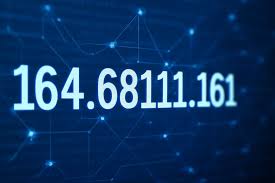Welcome! You’ve likely landed here because you’ve come across the number 164.68111.161 and are curious about what it is. It might look like a random string of digits, but it’s actually an IP address. Think of an IP address as a unique street address for a device on the internet. It allows computers, servers, and other gadgets to find and communicate with each other. In this guide, we’ll break down everything you need to know about the IP address 164.68111.161, from its basic function to its potential role in networking and security.
Key Takeaways
- What is 164.68111.161? It’s an IPv4 address, which is like a unique identifier for a device connected to the internet.
- Why does it matter? IP addresses are fundamental to how the internet works, directing data traffic between devices and servers.
- Is it safe? An IP address itself is not inherently dangerous. However, it’s a piece of information that can be used by others, so understanding its role is important for digital security.
- Location and Ownership: The address 164.68111.161 is managed by a specific organization and is associated with a geographic location, which helps in routing internet traffic efficiently.
What Exactly is an IP Address?
Before we dive deeper into 164.68111.161, let’s get a clear picture of what an IP address is. “IP” stands for Internet Protocol, which is the set of rules governing how data is sent over the internet or a local network. An IP address is a unique string of numbers separated by periods that identifies each device. This system ensures that the data you send—like an email or a request to view a website—reaches its correct destination, and that any replies come back to you.
There are two main types of IP addresses in use today: IPv4 and IPv6. The address 164.68111.161 is an example of an IPv4 address. IPv4 addresses are 32-bit numbers, which means there are about 4.3 billion possible unique addresses. While that sounds like a lot, the explosion of internet-connected devices has nearly exhausted this supply. This led to the development of IPv6, which offers a vastly larger pool of addresses to meet future demand.
Public vs. Private IP Addresses
It’s also helpful to understand the difference between public and private IP addresses. A public IP address is the main address your home or office network uses to communicate with the rest of the internet. It’s assigned to your router by your Internet Service Provider (ISP). In contrast, a private IP address is used within your local network (like your home Wi-Fi) to identify individual devices like your laptop, smartphone, or smart TV. The IP address 164.68111.161 is a public IP address, meaning it’s visible on the global internet.
Deep Dive into the IP Address 164.68111.161
Now, let’s focus specifically on 164.68111.161. This is a public IPv4 address. Each public IP address is registered to an organization and is associated with a specific geographic location. This information is publicly available through a “WHOIS” lookup, which is a database that stores details about IP address and domain name registrations. This system is crucial for network administrators to troubleshoot issues, block malicious traffic, and manage internet resources.
Geographic and ISP Information
The address 164.68111.161 is registered to a specific Internet Service Provider (ISP) or a large organization that manages its own block of IP addresses. The physical location tied to this IP address points to a data center or a regional network hub. For 164.68111.161, the registration details indicate it is managed by a company based in North America. This doesn’t necessarily mean the end-user is in that exact city, but it tells us where the network that owns this IP is based. This kind of information is vital for content delivery networks (CDNs) to serve content from a server that is geographically closer to the user, reducing latency and improving speed.
How is this Information Used?
ISPs and other organizations use blocks of IP addresses like the one 164.68111.161 belongs to for various purposes. They might assign them to:
- Business clients who need a static, unchanging IP address.
- Web hosting servers that host websites and applications.
- Shared hosting environments where multiple websites share the same IP address.
- VPN servers that route user traffic through a specific location.
Understanding the origin of an IP address can be very useful. For example, a website might use this information to customize content based on your location, such as showing weather forecasts or news relevant to your region.
Is the IP 164.68111.161 a Security Risk?
Seeing an unfamiliar IP address can sometimes be alarming, especially if you find it in your security logs. However, an IP address itself is not a threat. It’s simply an address. The concern arises from how it’s used. Any IP address, including 164.68111.161, could potentially be involved in various online activities, both harmless and malicious. For example, it could be the source of a brute-force login attempt on your server or, conversely, it could just be a search engine bot indexing your website.
It’s important not to jump to conclusions. If you see activity from 164.68111.161 in your logs, the first step is to analyze the context. What was the IP address trying to do? Was it accessing a public webpage, or was it attempting to exploit a known vulnerability? Most of the time, traffic from a given IP is benign. It could be a user visiting your site, an automated tool performing a scan, or a service you use operating as intended. You can often check IP reputation databases online to see if 164.68111.161 has been flagged for malicious activity by others.
Protecting Your Own IP Address
While we’re discussing the specifics of 164.68111.161, it’s a good moment to think about your own digital footprint. Your public IP address is visible whenever you browse the internet. While this is necessary for the internet to function, you might want to protect it for privacy reasons. One popular way to do this is by using a Virtual Private Network (VPN). A VPN encrypts your internet traffic and routes it through a server in a location of your choice. This masks your real IP address, replacing it with the IP address of the VPN server, which enhances your online privacy and security.

How IP Addresses are Assigned and Managed
The global pool of IP addresses isn’t a free-for-all. It’s a highly organized system managed by the Internet Assigned Numbers Authority (IANA). IANA allocates large blocks of IP addresses to five Regional Internet Registries (RIRs) around the world.
|
RIR Name |
Region Covered |
|---|---|
|
ARIN (American Registry for Internet Numbers) |
United States, Canada, and parts of the Caribbean |
|
RIPE NCC (Réseaux IP Européens Network Coordination Centre) |
Europe, the Middle East, and parts of Central Asia |
|
APNIC (Asia-Pacific Network Information Centre) |
Asia and the Pacific region |
|
LACNIC (Latin America and Caribbean Network Information Centre) |
Latin America and parts of the Caribbean |
|
AFRINIC (African Network Information Centre) |
Africa |
These RIRs then distribute smaller blocks to ISPs and large organizations within their respective regions. The IP address 164.68111.161 falls under the jurisdiction of ARIN, as its registration points to North America. For more interesting global updates and tech news, you can check out resources like those found at https://worldupdates.co.uk/. This hierarchical system ensures that IP addresses are distributed fairly and efficiently, preventing any single entity from hoarding them.
Static vs. Dynamic IP Addresses
When an ISP assigns an IP address, it can be either static or dynamic.
- Static IP: A static IP address never changes. It’s permanently assigned to a device. Businesses often need static IPs for their web servers, email servers, or for employees to remotely access their network.
- Dynamic IP: A dynamic IP address is temporary and can change. Most residential internet connections use dynamic IPs. ISPs have a pool of addresses they assign to customers for a certain period. When you disconnect and reconnect, you might get a new one. This is more cost-effective for ISPs.
The IP address 164.68111.161 is most likely a static IP address assigned to a server or a business, given that it’s part of a block managed by a large hosting provider.
How to Find Your Own IP Address
Curious about what your own public IP address is? Finding it is very simple.
- Use a Search Engine: Open Google or another search engine and type “what is my IP address”. The search engine will display your public IP address at the top of the results.
- Visit a Specialized Website: There are many websites dedicated to this purpose. Simply visiting one will show you your IP address along with other details like your ISP and general location.
- Check Your Router Settings: You can also log into your router’s administrative interface. Your public IP address is usually displayed on the status or dashboard page.
Knowing your IP address can be useful for troubleshooting network issues or for setting up services that require it.
Frequently Asked Questions (FAQ)
Q1: Can someone find my exact location using my IP address?
No, an IP address does not reveal your precise physical address. It can usually be traced back to your city or a general area, but it won’t pinpoint your home. The location information is tied to your ISP’s network infrastructure, not your personal address.
Q2: Should I be worried if I see 164.68111.161 in my firewall logs?
Not necessarily. It’s common to see various IP addresses in firewall logs. The address 164.68111.161 belongs to a known hosting provider, so the traffic could be from a legitimate service or bot. You should only be concerned if the activity is repetitive, aggressive (like thousands of login attempts), or targets a specific vulnerability on your system.
Q3: How can I block traffic from 164.68111.161?
If you have determined that the traffic from 164.68111.161 is malicious, you can block it using your firewall. Most firewalls allow you to create a rule to deny all incoming traffic from a specific IP address. You can do this through your router’s settings, your operating system’s built-in firewall, or a dedicated security appliance.
Q4: Is it legal to look up information about an IP address?
Yes, it is perfectly legal. IP address registration information is public record. Services like WHOIS are designed to provide transparency about who owns and manages different parts of the internet’s infrastructure.
Q5: Could my device be assigned the IP address 164.68111.161?
It’s highly unlikely for a typical home user. This IP address is part of a block assigned to a specific company, likely for use in a data center. Your home internet connection will be assigned a dynamic IP address from a pool owned by your personal ISP.
Conclusion
The number 164.68111.161 is more than just a random sequence of digits; it is a public IPv4 address that plays a role in the vast, interconnected network we call the internet. It serves as a unique identifier, likely for a server or network device managed by a hosting company in North America. While seeing an unknown IP in your logs can be puzzling, it is usually part of the internet’s normal background noise.
By understanding what IP addresses are, how they are managed, and the context behind an address like 164.68111.161, you can become a more informed and confident digital citizen. The internet’s infrastructure is complex, but its foundational concepts are accessible to everyone. Armed with this knowledge, you are better equipped to navigate the digital world safely and effectively.















Leave a comment